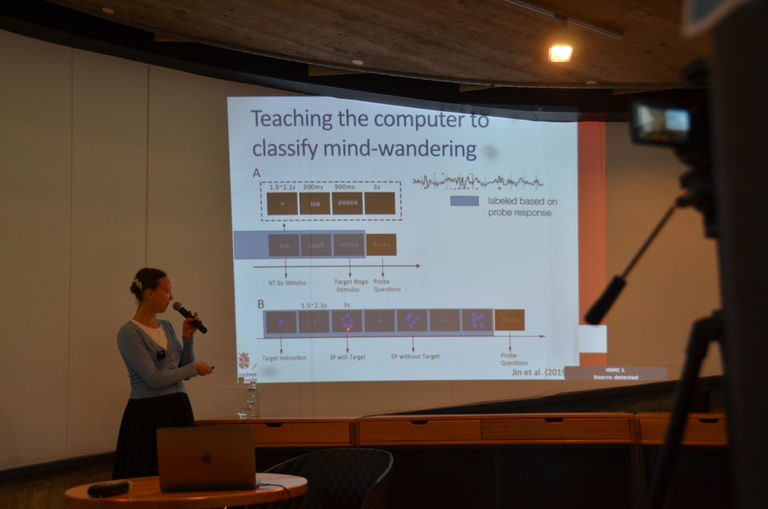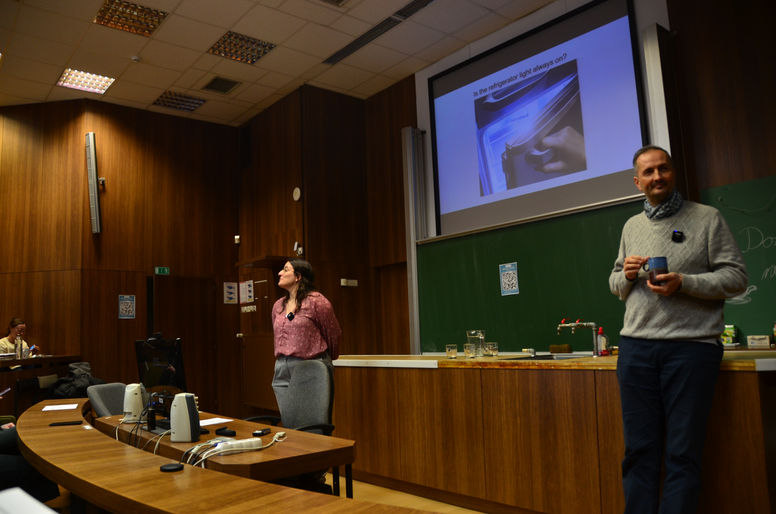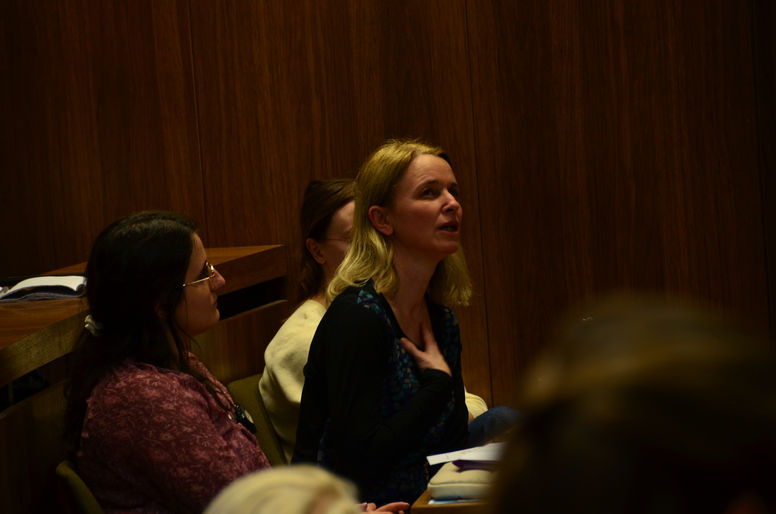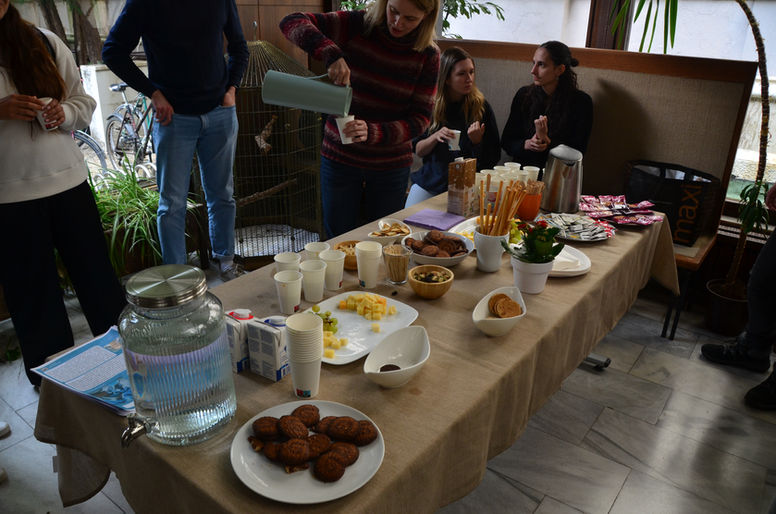
Wanderings
A series of workshops, lectures and roundtable discussions on mind wandering and the broader scope of human experience. Our aim is to acquaint both professionals and the lay audience with intriguing phenomena that are integral to our everyday experience, yet still not well understood (e.g., mind wandering), as well as the ways these phenomena can be researched.
Previous events


On average, we spend at least half of our waking life wandering through mental landscapes, far away from what is happening in the present moment. Despite the extraordinary frequency of mind wandering, we know surprisingly little about this process. For more than a year, a team of neuroscientists, psychiatrists, psychologists, linguists, and mobile app designers has been studying this phenomenon from multiple perspectives.
The final event of the 2024/25 academic year in Wanderings event series will take place on Tuesday, 30 September 2025, from 6:30 to 8:00 PM, this time in the lecture hall of Center Rog (2nd floor). The gathering will explore the hidden layers of mind wandering and, above all, invite a conversation that will open up new topics, provide space for your questions, and offer an opportunity to share personal experiences of fascinating experiential landscapes of mind wandering.
The event will combine three short talks, each followed by a discussion:
-
Cognitive scientist Urban Kordeš will speak about how everyday experiences of mind wandering manifest: do we think in images, talk to ourselves internally, or perhaps “read” our own thoughts? Do we all wander in the same way, or does each of us have a unique manner of shaping our experiential world?
-
Psychologist Amela Lišić will highlight the social dimension of mind wandering – how we experience others in our everyday wanderings. She will open reflections on perceiving other people, our relationships with them, and our sense of self in relation to others.
-
Psychiatrist Borut Škodlar will focus on how we experience ourselves and co-create our identity while mind wandering. Thinking and feeling about ourselves are deeply connected inner processes that share a similar neurological basis. We will discuss these intriguing connections, which form an important part of everyday life.
The meeting will be moderated by dr. Mojca Stojan Dolar. It will be held in Slovene and last 1,5 h. Refreshments will be provided by Rog’s café Specialka (Goat Story).
The event is organized by the Laboratory for Empirical Phenomenology (Center for Cognitive Science, Faculty of Education, University of Ljubljana) as part of the European Researchers’ Night 2024–2025 project, funded by the European Union. For project purposes, the event will be photographed, and an attendance list will be kept. As the number of seats is limited, please register.
The event is open to everyone interested in the topic and admission is free. You are warmly invited to join us!




Learning through disconnection: Mind wandering is linked to probabilistic learning (18.30–19.25)
Peter Simor, ELTE Eötvös Loránd University
In the first part of the presentation, we will focus on exploring the links between sleep, dreaming and mind wandering. Mind wandering resembles dreaming in different aspects including phenomenological similarities regarding the content and nature of these experiences, the cognitive elements such as environmental disconnection, as well the shared neural underpinnings associated with mental experiences in wakefulness and sleep. In the second part, we will examine the potential advantages of mind wandering, particularly its role in implicit learning processes, where individuals extract regularities from their environment without awareness. In our first behavioural study, participants showed superior performance in probabilistic learning during periods of mind wandering, especially when such task-unrelated thoughts occurred spontaneously without intention. In a consecutive lab-based study, we observed that mind wandering and probabilistic learning were both associated with slow frequency neural activity, suggesting that mind wandering may reflect a transient, offline state facilitating rapid learning and memory consolidation. Finally, the third study presented in this talk highlights a functional trade-off between implicit, automatic and controlled cognitive processes. More specifically, we show that the magnitude of the learning enhancement during MW is quantitatively modulated by the efficacy of response inhibition. These findings demonstrate that transient lapses in top-down executive control directly facilitate the implicit extraction of environmental statistics, framing MW as a cognitive state that facilitates automatic, implicit learning.
Daily fluctuations in temporal orientations of mind wandering: Chronotype matters! (19.25–20.00)
Miha Likar, ELTE Eötvös Loránd University
In addition to task-based approaches, in our work we also focus on how mind wandering unfolds in daily life and how it is shaped by circadian factors. Using experience sampling methodology, we examined the dynamics of mind wandering across the day and its relationship with chronotype - the individual preference for earlier or later activity and sleep times. Our analyses reveal systematic fluctuations in the probability of mind wandering depending on time of day; however, this effect was surprisingly not chronotype-specific. Beyond frequency, we also explored the temporal orientation of mind wandering - whether thoughts tend to drift toward the past, present, or future - and found that these tendencies varied across the day in a chronotype-dependent manner. These findings suggest that spontaneous mental activity in everyday contexts is not random but follows predictable daily rhythms, possibly modulated by individual biological predispositions. Considering mind wandering within the framework of the sleep-wake cycle and circadian dynamics provides a complementary perspective to our lab-based studies, highlighting the ecological conditions under which spontaneous thought may arise in more beneficial or more disruptive forms. Finally, we will discuss future plans to investigate how daily fluctuations in alertness relate to different subtypes of mind wandering, including productive and disruptive forms, and how these subtypes may differentially affect cognitive processes such as automatic, implicit learning.



A few days later, we organised the second event in "Wanderings" series. We wee hosting dr. Marieke van Vugt, assistant professor at the University of Groningen (Netherlands). Her research focuses on mind-wandering—when, how, and why it occurs—as well as the cognitive processes underlying meditation and mindfulness.
She gave a lecture on the phenomenon of so-called "sticky thoughts"—repetitive mind-wandering episodes that arise in our everyday lives when we are not focused on the present moment. These thoughts are often difficult to "shake off," making us feel as though we have little control over them. In some cases, they can become so persistent that they interfere with daily functioning and quality of life. Such repetitive thoughts are particularly common in individuals with mental health conditions, such as depression. She also discussed ways to scientifically measure these thought patterns and, most importantly, explored what we can do to reduce them and cultivate greater mindfulness in the present moment. After the lecture, we hosted an interactive conversation with her that included the audience and their questions.
The event was free of charge and open to anyone interested in mind-wandering and a broader reflection on (dis)connection from the "here and now." It was held in a relaxed atmosphere of Stow Coffee, which provided also refreshments. The visitors were treated to a free specialty coffee.
Previous events




When physicists conduct research, they generally do not have to worry about how their measurements will influence the natural phenomena being measured. In the research of the human mind, unfortunately, we don’t have this luxury. As early as 1962, the psychologist Orne observed that, in the eyes of participants, an experiment represents a unique research situation and may serve as the strongest stimulus—often even more salient than the research task itself. He named the influence of participants' expectations upon entering an experimental situation "demand characteristics". Sixty years later, psychology and cognitive science still struggle with how to take this fact into account in our research work.
In the workshop with a roundtable discussion, we examined the impact of research and observation from multiple perspectives and attempted to answer the question of how psychological and, more broadly, cognitive-scientific research could incorporate this fact. The first speaker, Urban Kordeš, introduced the topic and emphasized the unavoidable role of observation in first-person research of consciousness. Madeline Stein, a psychologist from King's College London, discussed the significant impact of verbal suggestions in psychological experiments and clinical settings. Aleš Oblak, a cognitive scientist, explored our capacity to modify the structure of lived experience, highlighting its unique role in affective neuroscience.
The event concluded with a roundtable discussion addressing the question: How to think about the influence of observation? Besides all three previous lecturers, participants in the roundtable were Anja Podlesek, a psychologist and methodologist, and Grega Repovš, a psychologist and neuroscientist, both from the Department of Psychology (University of Ljubljana), who presented a psychological methodology perspective. The discussion will be moderated by Amela Lišić, a master's student of psychology. A significant portion of the roundtable was dedicated to answering audience questions.
The event was organised by the Laboratory for Empirical Phenomenology, Center for Cognitive Science (Faculty of Education, University of Ljubljana) as part of “Wanderings” event series. It was open to anyone interested in the research of the mind. With the aim of interdisciplinary collaboration it was primarily intended for psychologists and cognitive scientists.















































